|
|
|
Sort Order |
|
|
|
Items / Page
|
|
|
|
|
|
|
| Srl | Item |
| 1 |
ID:
187655


|
|
|
|
|
| Summary/Abstract |
Over the past decade or more, an increasing number of US initiatives and institutions has taken on the challenge of promoting policy-relevant research and bridging the academia–policy divide. Much of the emphasis of such programmes has been on how scholars can better engage the policy community and the broader public. Less attention has been paid to the pitfalls to avoid when seeking to bridge the gap. In this article, we argue that the more that scholars are engaged in producing and disseminating policy-relevant research, the more essential it is to consider how they can build a set of bridging standards to accompany their ideas. We identify four key dimensions of how scholars engage in policy and public debates and discuss how paying careful attention to these four ‘I's—Influence, Interlocutors, Integrity and Inclusion—can mitigate the most egregious instances of falling prey to a cult of relevance in bridging the gap. We then explore these factors in a discussion of two case-studies that highlight challenges that arise for those scholars who seek to contribute to policy and public debates: the applications of theories to US foreign policy surrounding the so-called democratic peace; and the efforts of international relations scholars to contribute to peace-building in post-conflict states.
|
|
|
|
|
|
|
|
|
|
|
|
|
|
|
|
| 2 |
ID:
187649


|
|
|
|
|
| Summary/Abstract |
Will China displace the United States as the world's leading power by the centenary of Communist rule in 2049? The outcome will depend on many unknowns including what the two countries do over the next three decades. US leaders are likely to rely on their mental maps of how the world works. The primary sources of their mental maps tend to come from historical analogies and from international relations theories. Both are highly imperfect representations of reality. Historical metaphors and analogies are rife in the debate over how to understand the current rise of China, but three are particularly salient: a Thucydides trap; a new Cold War; and 1914 sleepwalkers. This article discusses the merits and demerits of relying on each of these analogies in turn, and assesses the strengths and weaknesses of prior mental maps that guided US policy-makers during the post-Cold War era. Chinese elites expect to replace the US as the leading global power by 2049. How should the US respond? Two prevalent historical analogies are misleading: a Thucydides trap about power transition, and a new Cold War that ignores the three-dimensional nature of US–China interdependence. More promising is the cautionary narrative of sleepwalking into the First World War. A successful strategy must lay out conditions for a cooperative rivalry starting with a careful net assessment of power resources and the formulation of feasible goals.
|
|
|
|
|
|
|
|
|
|
|
|
|
|
|
|
| 3 |
ID:
187650
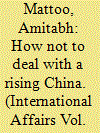

|
|
|
|
|
| Summary/Abstract |
Debates on China's rise often limit the focus on the continuity and sustenance of the United States' hegemony and the liberal global order. This debate often ignores the primacy of the regional actors, who are generally reduced to ‘pawns’ in great power politics, acting without agency, interests, or values of their own. Instead, this article suggests that as China rises—like any other great power of the past—it will first aim to secure regional primacy through an array of policy instruments. To test this it examines three case-studies: 1) China–Pakistan relations in nuclear proliferation; 2) China–India relations with respect to border conflict; and 3) Sri Lanka–China relations for development infrastructure. It finds that China's rise has not been benign and instead Beijing has adopted aggressive policies in its neighbourhood. This article finds that the strategic binary of balancing (interest-based containment) and engagement (constructive cooperation) does not reflect immediate realities and long-term sustainability for regional actors. Instead, it suggests the latter would be better advised looking for closer cooperation with like-minded allies in the region (and beyond) as a way forward.
|
|
|
|
|
|
|
|
|
|
|
|
|
|
|
|
| 4 |
ID:
187651


|
|
|
|
|
| Summary/Abstract |
Foreign interference poses an increasing threat in the current tensions among major powers, given pervasive expectations regarding its strategic effects and low costs. Transborder operations seeking to undermine a government or reinforce it against opposition emerge as a safer alternative to forcible coercion. Such operations incorporate assistance to political groups and individuals within a target state aiming to reorient its foreign policy, weaken its capabilities or promote one's ideology. However, this article exposes their deficiencies. It indicates the low chances of proxies to establish their rule, the difficulties in converting such accomplishments into benefits for an interfering state, and the emotional grievances from unfulfilled expectations. By delegating responsibilities, an interfering state loosens its operational control. The article strongly warns against targeting major powers as they are hard to subvert and supply proxies with opportunities to defect. The record of Soviet assistance to the Chinese Communists reveals the negative repercussions of the seemingly successful interference. It is a rare instance where interference targeting a major power produced a change in its government. For several years the People's Republic of China remained a military ally and ideological disciple to Moscow, but these accomplishments were unsustainable. Soviet leverage dissipated as the Chinese Communists consolidated their rule, while disagreements over standing and past wrongs precipitated the breakdown of cooperation. Although the recent debates on interference emphasize anxiety over the technological transformations, this article focuses on fundamental political limitations, ensuring applicability of its lessons in spite of potential changes in means employed by interfering states.
|
|
|
|
|
|
|
|
|
|
|
|
|
|
|
|
| 5 |
ID:
187654
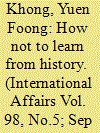

|
|
|
|
|
| Summary/Abstract |
This article attempts to answer two questions. First, what are the relevant ‘how not tos’ when it comes to learning from history? I argue that from existing accounts of how policy-makers (mis)learn the lessons of history, we can derive four ‘how not tos’: 1) do not settle or fixate on the first, or most ‘available’ or ‘representative’ analogy; 2) do not dismiss differences between your favoured analogy and the case in question; 3) do not neglect alternative analogies; and 4) do not shirk from ‘testing’ the observable implications of your preferred analogy. Second, do policy-makers show awareness of these ‘how not tos’ as they use historical analogies? An examination of how they are using the Cold War analogy to interpret the nature and trajectory of contemporary US–China relations suggest that they seem to have avoided the worst pitfalls of analogical reasoning in foreign affairs. The most prominent users of these historical analogies show awareness of the first three of the above proscriptions; all, however, shy away from the fourth proscription—testing the prognostications of their favoured analogy. Although this is far from perfect, the signs point to the Cold War analogy being used in ways that avoid the general pattern of superficial and poor use documented in existing analyses of analogical reasoning in foreign affairs.
|
|
|
|
|
|
|
|
|
|
|
|
|
|
|
|
| 6 |
ID:
187647


|
|
|
|
|
| Summary/Abstract |
The process of European integration has often been used as either a model or an anti-model for other regional integration experiences. This article discusses the European Union's shortcomings in crisis management, arguing that valuable ‘how not to’ lessons can be drawn by dissecting the initial stages of the eurozone crisis and the COVID–19 pandemic as ‘moments of truth’. The main policy mistakes committed at the onset of both crises are explored devoting special attention to the role played by the hiatus between research and policy, as well as the inadequacies, biases and hubris of academic analyses. Ideally, comprehensive reforms would be required to equip the EU with the competences and tools needed for effective crisis management. The article concludes that, in the absence of such comprehensive reforms, the only option left to policy-makers engaging in crisis management will be to seek a pragmatic middle ground between supranationalism and intergovernmentalism on a case-by-case basis.
|
|
|
|
|
|
|
|
|
|
|
|
|
|
|
|
| 7 |
ID:
187653


|
|
|
|
|
| Summary/Abstract |
This article questions the appropriateness of third parties' interventions seeking to foster political reconciliation. The analysis is divided into three parts. The first stresses a widely accepted premise in the field of conflict resolution, namely that mediation oriented towards reconciliation is inherently positive. The second part questions this moralistic perspective. It emphasizes the limits of specific mediation processes designed to transform the relationships between former enemies. The third part concentrates on the ‘pragmatics’ of mediation. It highlights the tensions, contradictions, and dilemmas faced by third parties eager to favour a rapprochement between parties. The intention of the article is to be neither cynical nor euphoric about calls for reconciliation coming from third parties. It explores the notion of failure, considering three main variables: the actors' intentions, timing, and the effects on the most affected populations (survivors and families of victims). From a practical perspective, a better understanding of the issue is a sine qua non condition for more efficient interventions. From an ethical perspective, it is crucial to consider whether calls for reconciliation coming from outside might paradoxically contribute to new patterns of exclusion.
|
|
|
|
|
|
|
|
|
|
|
|
|
|
|
|
| 8 |
ID:
187645
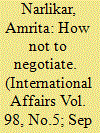

|
|
|
|
|
| Summary/Abstract |
Trade multilateralism would not have featured as a case of ‘abject failure’ had this special issue been planned in 2001. But since then, the World Trade Organization (WTO) has unfortunately become an almost perfect example of how not to negotiate, even when one takes into account the limited successes of the 12th ministerial conference in June 2022. This article proceeds in four steps. The first section outlines the multiple levels of malfunction and breakdown in the organization. The second part argues that a variety of negotiation failures are responsible for the dire straits in which the WTO finds itself today. I identify three broad categories of bargaining failures in this member-driven organization: negotiation mishaps that have led to the Doha deadlocks; negotiation muddles that members have got themselves into while updating the institutional practices of the WTO; and failures on the part of the membership to find negotiated solutions to new systemic challenges. The third section reflects on the interaction of my own research with the world of policy. The fourth and concluding section presents the main ‘Dos’ and ‘Don'ts’ that follow from the analysis, and offers some further policy recommendations.
|
|
|
|
|
|
|
|
|
|
|
|
|
|
|
|
| 9 |
ID:
187643
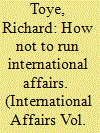

|
|
|
|
|
| Summary/Abstract |
This article explores three case-studies—the Munich crisis of 1938, the Suez crisis and war of 1956 and the Iraq war of 2003—as examples of ‘how not to run international affairs’. On the face of it, all three episodes were disasters. Irrespective of whether Munich was strategically correct, Neville Chamberlain's public presentation of the agreement was a clear miscalculation. Anthony Eden created an elaborate pretext for invading Egypt, which was nevertheless so see-through that it destroyed British credibility. Tony Blair appears to have persuaded himself into believing that Saddam had weapons of mass destruction, and basing his case for war upon this idea left him exposed when the weapons were shown not to exist. Whereas it is easy to say that these mistakes should not have been made, it is harder to suggest mechanisms that would prevent leaders falling prey to such delusions, when their immediate political interests appear to depend on them. The article concludes that in these three cases failure was over-determined; on the other hand, there are many everyday crises that foreign policy actors, who understand ‘how not to run international affairs’, succeed in preventing from turning into disasters.
|
|
|
|
|
|
|
|
|
|
|
|
|
|
|
|
| 10 |
ID:
187644
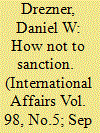

|
|
|
|
|
| Summary/Abstract |
In the past century economic sanctions have emerged as a prominent ‘off the shelf’ tool of diplomacy. This article examines two of the most high-profile failures in the history of economic sanctions: the United Nations sanctions against Iraq between the two Gulf wars, and the Trump administration's re-imposition of sanctions on Iran beginning in 2018. The technology of economic statecraft changed considerably between these two cases, indicating significant policy learning. In both instances, however, the sanctions imposed crippling costs on the target state without any observable concessions. In neither case was the primary goal achieved, and the negative policy externalities were considerable. An autopsy of these failures reveals three cautionary warnings. First, the recipe for sanctions success is not merely a function of the ability to impose costs on the target state. Second, an underappreciated impediment to the successful use of economic statecraft is a failure to articulate clear and consistent demands. Third, tight linkages between scholars and policy-makers can lead to improved policies in the short term, but long-term political imperatives within great powers can pervert such successes.
|
|
|
|
|
|
|
|
|
|
|
|
|
|
|
|
| 11 |
ID:
187646


|
|
|
|
|
| Summary/Abstract |
In what ways can there be a learning from the past in the case of financial crises? A short-run assessment looks frequently different to a longer retrospective: policies that once appeared to be the best available turn out to be counter-productive. The article tackles this issue by examining three iconic and world-changing cases of financial crisis: 1931, 1997 and 2008. In each, it looked at first as if there was a substantial success, because the measures adopted corresponded to conventional wisdom. But those immediate responses, in each case driven by the sense that past mistakes needed to be avoided, in the end unfortunately set the stage for a new set of problems, and thus for the next crisis. Even though multilateral solutions might have been the best answer, the concrete dynamics of responding to crises politically produces national solutions, which may drive a nationalization of politics. The immediate and conventional solutions did not adequately deal with the social and political fallout from increasing disillusion with the way that the solutions are applied, and with the (in part) unintended consequences they produce. The side-effects of anti-crisis medicine are thus unpleasant and liable to generate new tensions.
|
|
|
|
|
|
|
|
|
|
|
|
|
|
|
|
| 12 |
ID:
187648
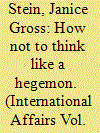

|
|
|
|
|
| Summary/Abstract |
As the United States experiences a relative decline in its share of global GDP and China increases its relative share, there is growing concern about the consequences of intensifying competition between the two great powers. This article takes a wider angled view, warns against a single narrative and provides a collection of plausible stories. First, the story of the rise of China and the decline of the United States that relies heavily on ‘hard’ measures like GDP and relative military capability overlooks other relevant indicators such as normative and network power. I argue that the United States enjoys considerable advantages as measured by both these indicators and will continue to do so for some time. Second, the status of a great power in the international system is a product not only of systemic and structural forces but also of economic and political capacity that enables governments to make strategic choices. The future is contingent, not determined, because the strategies leaders choose matter. I build a matrix of nine possible worlds that result from the choices that the leaders of China and the United States could make over the next twenty years. Finally, I argue that the biggest threat to international peace may come not from rising powers, but when the leaders of the challenger as well as the defender fear that their power may have peaked and that they are beginning to decline.
|
|
|
|
|
|
|
|
|
|
|
|
|
|
|
|
| 13 |
ID:
187652


|
|
|
|
|
| Summary/Abstract |
While the Cold War seemingly ended the prospect of nuclear annihilation, in the West it also brought about renewed belief in the utility of force. A warming international political environment and developments in precision technology (as demonstrated by the 1990–91 Gulf War) appeared to create a permissive environment in which western states, particularly the United States, armed with smart weapons, international resolutions and a capacity to engage anywhere and whenever they want to—and all at a low cost—could bring about improvements in some of the most desperate and war-torn places on the planet. Nations who possessed a large, technologically precise and sophisticated hammer could suddenly view world problems as convenient, easily fixed nails. The end result of this vision, however, has been disaster—resulting in flawed intervention after failed intervention, including Somalia, the Balkans, Afghanistan, Iraq and Libya. Indeed, these supposedly ‘easy wars’ have become ‘forever wars’. The question is: why has the West continually failed to learn this lesson? This article explores how the chaos that ensues in the wake of ‘easy war’ conflicts has reinforced a tendency within Washington policy-circles to utilize weapons that are more automated and/or remove individuals from the battlefield entirely. The lesson that technology cannot conquer the ‘fog of war’ to create costless victory or replace the hard work of politics and diplomacy is never learned. And even as President Joe Biden's administration begins to pivot towards Russia and Asia, it is likely that this tendency will endure.
|
|
|
|
|
|
|
|
|
|
|
|
|
|
|
|
| 14 |
ID:
187642


|
|
|
|
|
| Summary/Abstract |
In the century of International Affairs' existence, there have been a lot of catastrophic critical junctures when a different policy decision, underpinned by an alternative epistemic framing, might have led to a more peaceful and prosperous world. In this special issue, we consider the well-intentioned efforts of humanity over the past century that turned out badly. Much of foreign policy analysis seeks to replicate successes; we humbly ask whether it might make more sense to examine how to avoid disastrous failure. In this introductory article we develop a concrete definition of policy failure and provide a motivation for why the study of failures is relevant for the coming century. We suggest a Hippocratic Oath for policy-minded scholars, and advance guidelines to help go beyond Barack Obama's ‘Don't do stupid shit’ injunction and also guard against potential policy paralysis. Finally, we offer conclusions derived from the other articles in this special issue that are relevant for both the study and practice of international relations. Armed with these insights, practitioners—and the researchers who advise them—may stand a better chance of avoiding some of the worst pitfalls of international relations; occasionally, together, we may even get some things right.
|
|
|
|
|
|
|
|
|
|
|
|
|
|
|
|
|
|
|
|
|